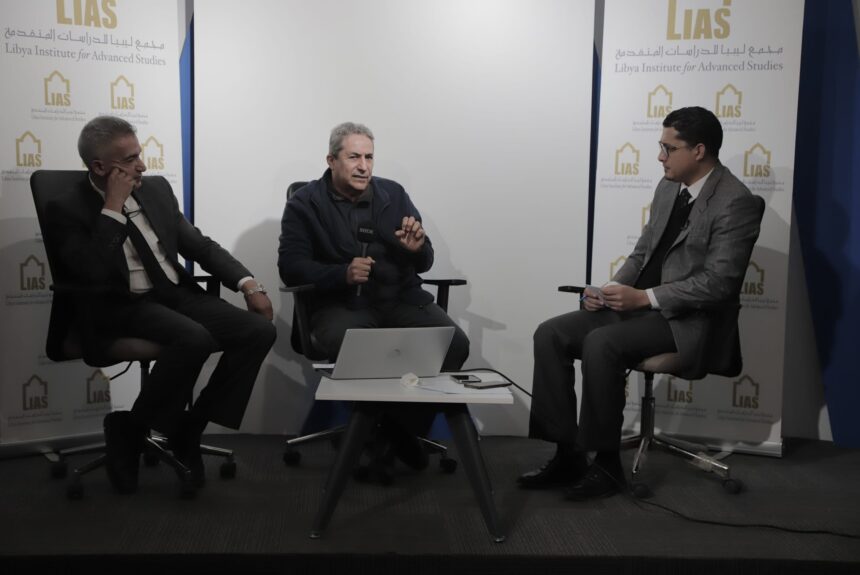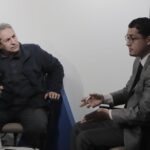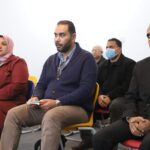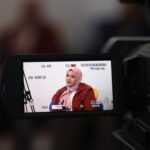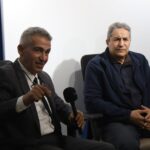Yesterday, Monday, the Libya Academy for Advanced Studies organized a meeting entitled: (The Role of the Civil Aviation Organization and Air Safety).
Mr. Salah Ayyad Al-Abbar, the moderator of the session, discussed the role of civil aviation and solving problems in terms of safety and regulation of the aviation industry in Libya.
Hosting Captain #Abdel_Moneim_Al-Mabrouk
Director of the Safety Office at Libyan Airlines Company
And engineer #Asaad_Al-Salabi, trainer and aircraft maintenance engineer.
Captain Abdel Moneim spoke about safety, supervision and follow-up to investigate the application of standards, follow-up and periodic inspection of all airport facilities and safety systems, whether in administrative buildings and aircraft aprons, and the level of safety and security therein, and submitting continuous periodic reports on that.
He referred to the work on installing automated landing organizations at Libyan airports, as well as the maintenance of those parked ones. He touched on the role of civil aviation in issuing licenses and permits based on international conditions and specifications as set by ICAO and working to remove Libya from the embargo. He also talked about the importance of quality training for technical and administrative personnel in Airlines .
Engineer Asaad Al-Salabi also spoke about the role of the Civil Aviation Organization, operating licenses, how to lift the ban on Libyan-European airlines, and the safety procedures followed by the European Aviation Safety Organization. He also spoke about the nature of the work of flights that take place with approvals, especially Middle Eastern countries that still grant transit approval only for flights. Libyan. He also talked about other international organizations that regulate the work of the aviation industry in general, and also about the localization of heavy aircraft maintenance workshops in Libya as a type of investment.
Participation was made available to attendees; Captain Ahmed Banka spoke about the reasons for the civil aviation ban, its security and civil reasons, and the exposure of airport control stations to many problems due to the war.
Professor Nasser Al-Haddad shared the necessity of benefiting from the expertise of retired engineers and pilots who have sufficient experience to establish an academy or institute, which is carried out through plans carefully studied, reviewed and approved by academics.
Ms. Hanan also participated, speaking about activating oversight for engineers and civil aviation workers
Professor Sarah Al-Talhi concluded by talking about the role of the Libyan state and the Ministry of Transport in taking care of new cadres of university students interested in the field of civil aviation and training them practically on aircraft in Libya in an easy, convenient, advanced and smart manner.
Mr. Salah Ayyad Al-Abbar, the moderator of the session, discussed the role of civil aviation and solving problems in terms of safety and regulation of the aviation industry in Libya.
Hosting Captain #Abdel_Moneim_Al-Mabrouk
Director of the Safety Office at Libyan Airlines Company
And engineer #Asaad_Al-Salabi, trainer and aircraft maintenance engineer.
Captain Abdel Moneim spoke about safety, supervision and follow-up to investigate the application of standards, follow-up and periodic inspection of all airport facilities and safety systems, whether in administrative buildings and aircraft aprons, and the level of safety and security therein, and submitting continuous periodic reports on that.
He referred to the work on installing automated landing organizations at Libyan airports, as well as the maintenance of those parked ones. He touched on the role of civil aviation in issuing licenses and permits based on international conditions and specifications as set by ICAO and working to remove Libya from the embargo. He also talked about the importance of quality training for technical and administrative personnel in Airlines .
Engineer Asaad Al-Salabi also spoke about the role of the Civil Aviation Organization, operating licenses, how to lift the ban on Libyan-European airlines, and the safety procedures followed by the European Aviation Safety Organization. He also spoke about the nature of the work of flights that take place with approvals, especially Middle Eastern countries that still grant transit approval only for flights. Libyan. He also talked about other international organizations that regulate the work of the aviation industry in general, and also about the localization of heavy aircraft maintenance workshops in Libya as a type of investment.
Participation was made available to attendees; Captain Ahmed Banka spoke about the reasons for the civil aviation ban, its security and civil reasons, and the exposure of airport control stations to many problems due to the war.
Professor Nasser Al-Haddad shared the necessity of benefiting from the expertise of retired engineers and pilots who have sufficient experience to establish an academy or institute, which is carried out through plans carefully studied, reviewed and approved by academics.
Ms. Hanan also participated, speaking about activating oversight for engineers and civil aviation workers
Professor Sarah Al-Talhi concluded by talking about the role of the Libyan state and the Ministry of Transport in taking care of new cadres of university students interested in the field of civil aviation and training them practically on aircraft in Libya in an easy, convenient, advanced and smart manner.


